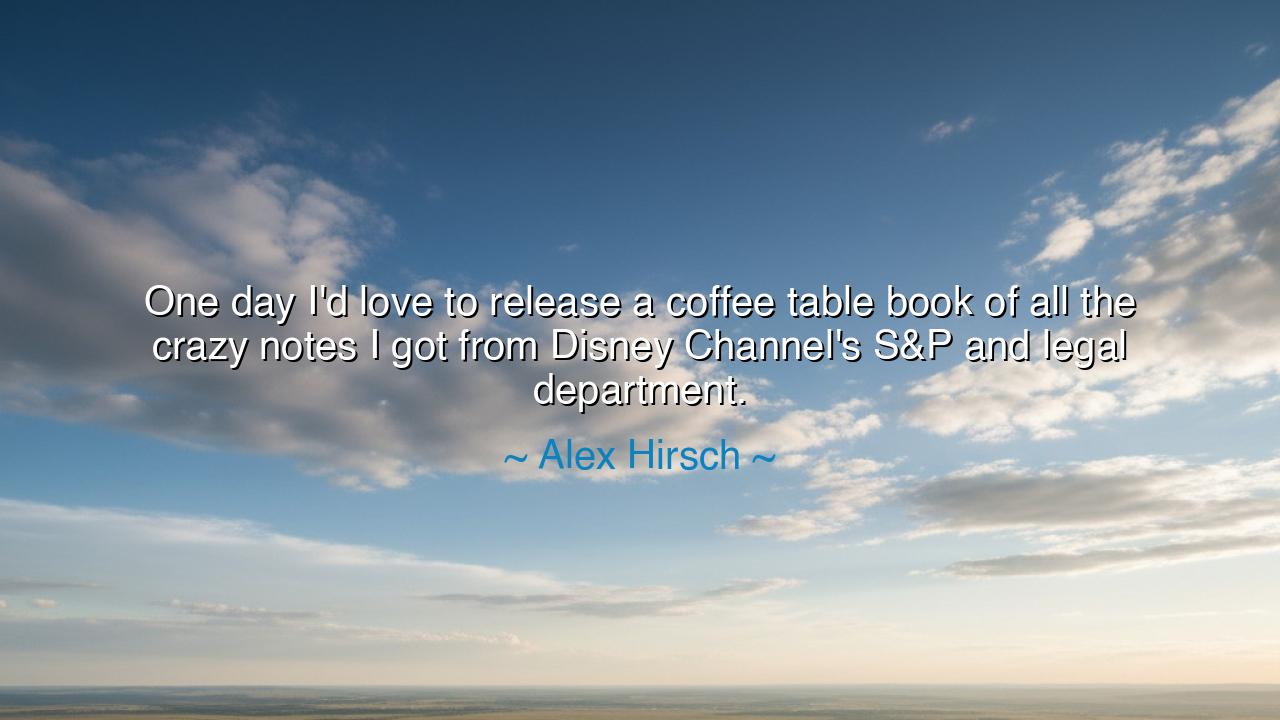
One day I'd love to release a coffee table book of all the crazy
One day I'd love to release a coffee table book of all the crazy notes I got from Disney Channel's S&P and legal department.






When Alex Hirsch said, “One day I’d love to release a coffee table book of all the crazy notes I got from Disney Channel’s S&P and legal department,” he was not merely joking about the absurdities of corporate censorship — he was speaking to an eternal struggle between creativity and control, between the dreamer and the gatekeeper, between the spark of art and the walls that seek to contain it. Beneath his humor lies the lament of every artist who has faced the cold machinery of bureaucracy. His words, laced with irony and laughter, conceal the pain of a creator whose vision must pass through filters designed not for beauty, but for safety, propriety, and fear of offense.
In the style of the ancients, one might say that Hirsch spoke as a jester-philosopher — a man who laughs at the absurd to protect his soul from bitterness. His jest conceals a wound shared by all who labor under authority: the frustration of seeing imagination shackled by caution. He was not rebelling against morality, but against the timidity of those who confuse innocence with ignorance. To the artist, every line drawn by corporate hands is a shadow across the sun of inspiration. And so, Hirsch’s dream of a “coffee table book” is not merely a wish to amuse, but a symbolic act of defiance — the desire to immortalize the absurd restrictions placed upon creativity, and to turn them into laughter, art, and perhaps, quiet revenge.
The origin of this quote lies in Hirsch’s experience as the creator of Gravity Falls, one of Disney Channel’s most beloved animated series. Behind its humor, mystery, and heart, the show constantly pushed against the limits of what was “acceptable” for children’s television. Hirsch often received pages of notes from Disney’s Standards and Practices (S&P) and legal teams — lists of what could not be said, implied, or shown. Some notes were reasonable, others ridiculous: jokes about ghosts or romance were censored, expressions of emotion deemed “too intense,” even background details scrutinized for potential controversy. For every moment of wonder that reached the screen, there were countless ideas buried beneath the weight of legal ink. His quote, then, is both a sigh and a smirk — an artist’s acknowledgment that his truest creative battles were not with the blank page, but with those who feared what it might say.
This conflict is as old as art itself. Consider the fate of Galileo, whose truth about the heavens was silenced by the Church, or Molière, whose comedies were banned for daring to mock hypocrisy. Or recall Leonardo da Vinci, who cloaked his studies in code to avoid persecution. Like Hirsch, these visionaries faced institutions that sought to tame the boundless with boundaries. Their stories remind us that every age has its censors, whether robed in theology or corporate policy. The artist’s path, therefore, has always been one of cunning and resilience — finding ways to speak truth in symbols, to hide rebellion in laughter, to whisper eternity through the cracks of conformity.
Hirsch’s humor transforms his frustration into art. By imagining a “coffee table book” of censorship notes, he reclaims power over the very system that sought to limit him. He turns restriction into story, critique into creation. This is the ancient alchemy of the artist — to make beauty out of resistance, to transmute the iron of limitation into gold. Just as Michelangelo freed his angels from marble, so the modern storyteller must free imagination from contracts and clauses. Hirsch teaches us that when the world forbids the flame, the wise do not despair — they learn to make fire from sparks.
Yet within this laughter lies a sobering truth. The world often demands that creativity bend to comfort, that originality be softened to suit the market. But art is not born to please — it is born to reveal. The artist must walk the narrow path between expression and acceptance, knowing that the truest work often begins where permission ends. Hirsch’s words remind us that the spirit of creation cannot be governed by forms, committees, or fear. To create freely is to risk disapproval; to obey too much is to betray the soul.
The lesson of his words is this: guard your creative fire, and do not let institutions — however powerful — dim its light. Laugh at the absurdity of those who would confine imagination, but never surrender to it. If the gatekeepers give you notes, turn them into stories; if they silence you, make your silence thunder. Let your art be clever, resilient, and defiant — not through anger, but through brilliance. For in the end, the artist’s greatest victory is not rebellion alone, but the endurance of truth disguised as entertainment, wisdom hidden in laughter.
So let Alex Hirsch’s jest be remembered as a torch for all creators: when the world tries to shrink your art to fit its comfort, answer with wit, courage, and a smile. Turn censorship into comedy, limitation into legend, and remember — though the law may write in ink, the imagination writes in stars, and no department on earth can edit the sky.






AAdministratorAdministrator
Welcome, honored guests. Please leave a comment, we will respond soon